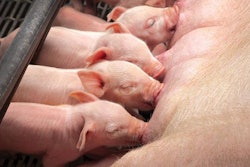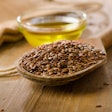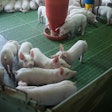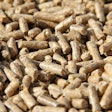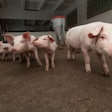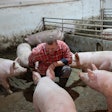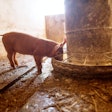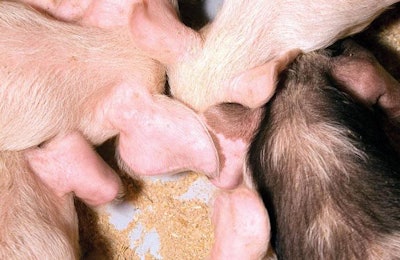
The definition of a functional ingredient will vary between scientific disciplines, but for the purpose of this article, we define a functional ingredient as an ingredient that improves animal performance and well-being more than what can be explained solely by our understanding of nutrition.
Spray-dried plasma (SDP) is such a functional protein source that has considerable peer-reviewed research describing its impact on immune response and barrier function when fed to animals. Other functional ingredients that affect intestinal health include probiotics, prebiotics, egg antibodies, plant extracts and yeast derivatives.
Functional fibers
The objective of using a fermentable carbohydrate in diets for weanling piglets is to improve microbiota composition and functionality in both the small and large intestines. At birth, the gut is considered sterile and is then colonized by microbes present from the sow and environment, starting with lactic acid bacteria, enterobacteria and streptococci. The neonatal and weanling piglets are highly susceptible to enteric diseases. Piglets weaned in a commercial environment experience major changes in intestinal microbiota composition that can be influenced by diet, environmental factors and the host. In a short period, the intestinal microbiota will develop from a simple unstable community to a complex and stable community that will increase competitive exclusion. It is also involved in defense against pathogens and prevention of diarrhea. Therefore, the composition of the diet is important for determining the composition and activity of the intestinal microbiota.
A high level of lactose in the diet favors the colonization by bifidobacteria and lactobacilli, and reduces the number of E. coli. In addition, it has been suggested that the intestinal microbiota of weaned piglets is affected by the inclusion of inulin, lactulose, sugar beet pulp and wheat bran. The addition of inulin to the basal diet will affect the proportion of piglets with detectable levels of bifidobacteria while lactobacilli are not affected.
It is also interesting to understand that the intestinal microbiota will slowly adapt to the inclusion of a specific prebiotic in the diet, and therefore this adaptation will be gradually lost after removal of this compound. Although prebiotics create beneficial conditions for gut health, direct evidence of improved resistance to unfavorable conditions or under pathogen challenge are not clear-cut.
Some studies show that there is an improved intestinal immune response in animals fed diets containing animal plasma.
Direct-fed microbials
Direct-fed microbials are a source of live and natural-occurring microorganisms in the diet. Usually the microorganisms used are from lactic acid bacteria, yeast and Bacillus group. Including probiotics in the diet is usually associated with reduced pathogenic adherence and inflammation.
As mentioned before, weaning is the time to develop a complex and stable microbial community in the intestinal tract; therefore, the use of probiotics in the diet should be a targeted application. According to the literature, many mechanisms are involved in the application of probiotics to protect intestinal epithelial cells against entero-toxigenic E. coli (ETEC), like competitive exclusion, reduced ETEC adhesion, maintenance of epithelial tight-junction integrity, increased mucin gene expression and reduced neutrophil transmigration. Like prebiotics, the beneficial effects of probiotics are not always consistent under commercial stress environments or challenge conditions
Plant extracts
Plant extracts are composed of hundreds of individual components that are secondary plant metabolites that can be naturally obtained from parts of plant materials or synthesized directly. Most plant extracts are in oil form and usually are known as essential oils, which are mixed oil compounds (carvacrol, cinnamaldehyde, oregano, etc).
Supplementation of plant extracts in diets for newly-weaned pigs has been reported to have variable effects on growth, but in grower-finisher periods, some benefits on growth performance have been demonstrated. The main effect reported for plant extracts is reduced inflammation by suppressed pro-inflammatory cytokines in macrophages. However, due to a lack of data on the bioactive components of particular plants and the large diversity of species, it is difficult to formulate extracts of equivalent potency; therefore, the literature available remains inconclusive.
Yeast products
Yeast culture (YC) is a dried, fermented product containing small amounts of live yeast cells (Saccharomyces cerevisiae) and metabolic by-products produced by the yeast during fermentation. Enzymes, vitamins, saccharides and other metabolites produced from yeast fermentation may benefit the growth, metabolism and health of pigs. Yeast culture and cell wall products (CWP) containing mannanoligosaccharides (MOS) and β-glucans may benefit the animal because MOS is a class of carbohydrate that are not absorbed or digested in the small intestine and reach the colon. In the colon, oligosaccharides are readily fermented by the intestinal microflora, and changing the intestinal microflora could be beneficial because it stimulates intestinal immunity.
Several studies have investigated the action of yeast cell wall components on the immune function of weaned pigs, showing that yeast cell wall components (e.g., mannans) may modulate the immune response of pigs to maintain animal health and improve growth performance by reducing pathogenic bacteria and improving gut health. However, the performance response of piglets to dietary yeast or YC has been variable. Finally, live yeast supplementation may improve the performance and health of piglets by altering the immune system and maintaining a beneficial intestinal environment.
Egg yolk antibodies
Egg yolk antibodies (EYA) produced from hens hyper-immunized against specific bacterial pathogens have been suggested as an effective way of controlling diarrhea in post-weaned pigs. Positive responses to EYA have been consistent when the challenge microorganism in piglets is the same as that for which the hens were hyperimmunized against. Logically, no such immunity is expected for pathogens that are not represented in the hyper-immunized product containing egg yolk antibodies.
Animal plasma
SDP consists primarily of albumen and globulin along with other proteins or peptides. Numerous studies involving challenge or natural infection with pathogenic bacteria, viruses or protozoa have reported reduced mortality and/or improved health indices in pigs fed diets containing animal plasma. Although SDP contains globulin proteins, antibody neutralization of antigens in the lumen does not fully explain all the improvements noted in animals fed plasma.
Scientific reviews clearly show that the addition of SDP to pig diets at weaning increases feed intake, growth rate and improves feed. SDP also reduces mortality and morbidity in studies conducted in pigs challenged with different pathogenic bacteria and viruses. In addition, it is considered an excellent alternative to antibiotics, and some studies also show that there is an improved intestinal immune response in animals fed diets containing animal plasma.



